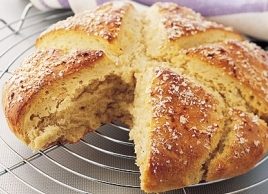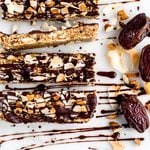Potato Scones
Served fresh from the oven while still warm, scones are a popular treat. Here, mashed potatoes are added to the mixture, which makes these savoury scones wonderfully moist. Potato scones are a great way of using up leftover potatoes.
Source: Cook Smart for a Healthy Heart, Reader’s Digest Canada

| Servings | Prep Time | Cook Time |
| 6scone wedges | 10minutes | 20minutes |
| Servings | Prep Time |
| 6scone wedges | 10minutes |
| Cook Time |
| 20minutes |
- 2 cups self-raising flour
- 1/4 tsp mustard powder
- 1 1/2 tsp baking powder
- 1/4 tsp salt
- 2 tbsp reduced-salt margarine
- 1/4 cup low-fat milk or more as needed
- 3/4 cup cold mashed potatoes (without any milk or butter added)
- milk or beaten egg to glaze
- 2 tsp oatmeal to sprinkle
|
Ingredients
Servings: scone wedges
Units:
|
- Preheat the oven to 425ºF (220ºC). Sift the flour, mustard powder and baking powder into a large bowl and add salt. Rub in the margarine with your fingertips until the mixture resembles fine breadcrumbs.
- Place 1/4 cup milk and mashed potatoes in another bowl and mix well. Add to the dry ingredients and stir with a fork, adding another 1–2 tablespoons milk, if needed, to make a soft dough.
- Turn the dough out onto a floured work surface and knead lightly for a few seconds or until smooth, then roll out to a 15 cm round about 2 cm thick. Place on a greased baking sheet. Using a sharp knife, cut the top deeply to mark it into 6 wedges.
- Brush with milk or egg, then sprinkle with oatmeal. Bake for 15–20 minutes or until well risen and golden-brown.
- Transfer to a wire rack and break into wedges. Serve warm or leave to cool. The potato scones can be kept in an airtight container for 3 days and reheated to serve: set on a baking sheet, cover with foil and warm in the oven for about 5 minutes.
Potato scones variations: Instead of oatmeal, dust the scones with a mixture of 2 teaspoons all-purpose flour and 1⁄8 teaspoon paprika before baking. • For potato and feta scones, instead of margarine, stir 70 g feta cheese, finely crumbled, and 2 tablespoons snipped fresh chives into the dry ingredients.
Per wedge: 197 calories, 5 g protein, 5 g total fat, 1 g saturated fat, 1 mg cholesterol, 32 g total carbohydrate, 2 g sugars, 2 g fibre, 545 mg sodium
Potatoes, while not particularly high in vitamin C, provide fibre and potassium and are also low in fat. But be careful. Potatoes have a high GI rating.




